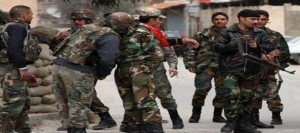The Syrian Fraud Market saves lives

“This is a big relief.”
I repeated this sentence in numerous calls I made to extend my gratitude to those who facilitated my younger brother Jawad’s defection from the Syrian army.
The ordeal took 21 days. After leaving his station on the Lebanese border, Jawad arrived at the Karkemich crossing in the Northern Syrian town of Jarablus on the Turkish border. Over the course of his journey, my brother had to cross many checkpoints and dangerous areas, and sometimes he even had to hide himself. Luckily, he had a forged identity card which allowed him to pass through checkpoints safely.

My brother Abdul Salam went through a similar experience after defecting from the regular army in June 2012. He managed to pass through seven government checkpoints between Damascus and Tel Tamar in the Hasaka province on the Syrian border using a fake ID without being discovered.
Early last summer, tension in Damascus was reaching a boiling point and I realized that my brothers could not remain in the army. We had hoped they would be allowed to leave after they finished their active service, but the fighting had reached the outskirts of Damascus, and it was clear they would not be allowed to go home, so I started planning their escape.
First I had to leave my job at a children’s clothing factory in Harasta, near Damascus, in order to have the freedom to move and plan. Then I managed to secure two fake IDs for them, as well as proofs of military service for Abdel Salam and a student’s card for military service postponement for my brother Jawad, due to his young age. I was able to obtain elaborate forgeries, and in doing so became privy to some of the secrets of what has become known as the ‘Syrian fraud market’, which continues to flourish in light of the increasing number of wanted individuals and army defectors. Fake documents are indispensable to a large number of Syrian activists as the only means to move about in relative safety, as their names are found on the lists of wanted people with tens of thousands of others.
The first step in my rescue operation was to contact one of my activist friends in the opposition. He advised me to obtain false ID papers through a network run by an engineer who calls himself Issam. My friend provided me with the code for establishing contact–a special greeting that identifies me to Issam without discussing details and names over the phone.
I met Issam in a cafe in the old city of Damascus after he refused to meet me in the house I had rented. During our meeting, he showed me examples of his work. Issam sees himself as supporting the revolution technologically and logistically by helping to save the lives of the people he falsifies papers for. The engineer said he only takes enough money to cover the cost of the workshop which makes the cards. Four days later, he handed me two ID cards containing each of my brothers’ pictures but with different personal data.
I also relied on a tailor named Abdel Kader from a village outside Hasaka. Abdel Kader is a man of many talents, including forging official stamps, which I needed for the proofs of military service. Abdel Kader first pressed a boiled egg onto the stamp covering the personal picture, transferring the ink to the egg. He then used the egg to re-stamp the fake document, using carbon paper to complete the copy. He carefully drew the stamp over my brother’s photograph and then pasted it into a military service book belonging to someone else. Abdel Kader refused to accept any money for his services, which impressed me because he is not well-off, but he said he does not take money because he is helping those in need.
Most counterfeiters in Syria now are new to the profession; they include engineers, real estate agents, university students and tailors. There are people who falsify papers for free because they are associated with the revolutionary movement or the Free Syrian Army, while others take hundreds of dollars for their services. Forgers usually charge around $100 for an ID, whereas prices for forged passports range from $700 to $1,000 depending on the skill of the forger, as well as the quality of printing.
In numerous meetings with friends in the opposition, we discussed the moral implications of forgery, and my own position was admittedly inconsistent. On the one hand, I am entirely against any form of corruption or fraud, but I am also eternally grateful to those who saved thousands of Syrians from death in the ranks of the regime’s army.
My friend Hatem, a journalist, said that forgery is part of the system of corruption, and that there is no excuse for it except when it can save a life.
“Except in this case, it is unacceptable,” he said.
For his part, Jawdat, an activist and refugee living in Gaziantep in Turkey, was more pragmatic. He sees forgery as a necessary temporary measure.
“All identity cards, both counterfeit and real, will be destroyed in the future,” he said smiling, adding: “There will be new identities for all Syrians.”
Other activists expressed fears that the growing phenomenon of fraud may lead to the emergence of professional crime networks that will hinder attempts to build a new Syria in the future. But there are thousands of Syrian soldiers and activists that have managed to escape from the hell of the regime army thanks to counterfeiters, and thousands of people with brothers like mine.
